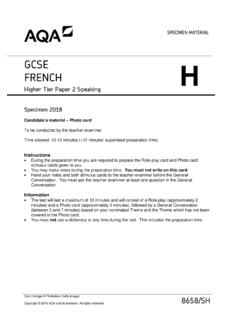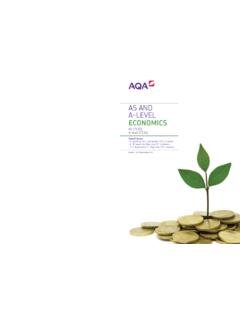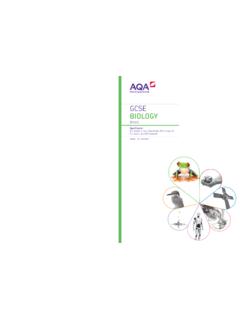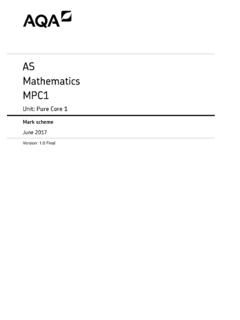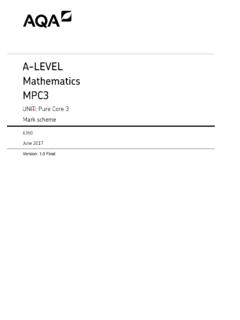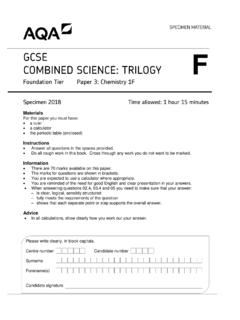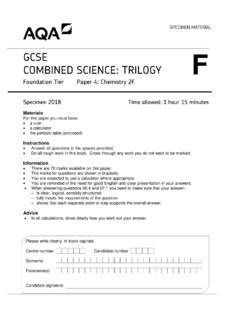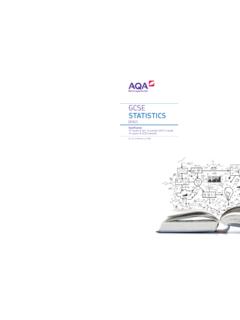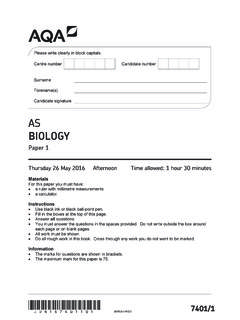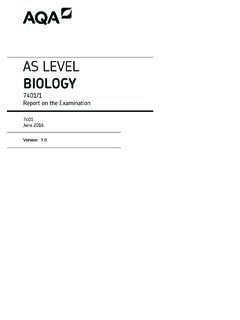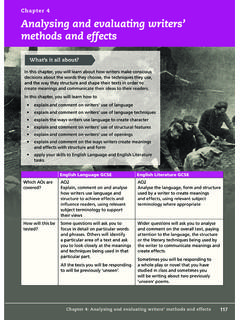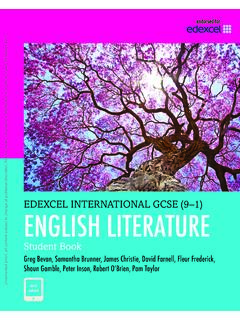Transcription of A-level English Language: Paper 2 Section B
1 Non-co nfidential A-level English Language Hub schools network meeting Paper 2 Section B: Language discourses Published: Spring 2019 AQ A Ed ucatio n (AQA) is a re gistered ch arity (number 1073334) and a co mp any limite d b y g uarantee re gistered in England and Wales (number 3644723). Our registered address is AQA, De vas S treet, Manchester M15 6EX. 2 o f 32 AQ A Ed ucatio n (AQA) is a re gistered ch arity (number 1073334) and a co mp any limite d b y g uarantee re gistered in England and Wales (number 3644723). Our registered address is AQA, De vas S treet, Manchester M15 6EX. 3 o f 32 Contents Contents Page Assessment Objectives 4 Introduction to Paper 2 Section B material 5 Worksheet one: Introduction to language discourses 6 Worksheet two: Researching language discourses 7 Worksheet three: Demonstrating understanding of language discourses 8 Worksheet four: Evaluating and challenging language discourses 10 Worksheet five: Developing a full analysis 11 Worksheet six: Working with two texts 16 Worksheet seven: Working with two of your own texts 24 Appendix: Texts one and two 25 AQ A Ed ucatio n (AQA) is a re gistered ch arity (number 1073334) and a co mp any limite d b y g uarantee re gistered in England and Wales (number 3644723).
2 Our registered address is AQA, De vas S treet, Manchester M15 6EX. 4 o f 32 Assessment Objectives AO1 Apply appropriate methods of language analysis, using associated terminology and coherent written expression. AO2 Demonstrate critical understanding of concepts and issues relevant to language use. AO3 Analyse and evaluate how contextual factors and language features are associated with the construction of meaning. AO4 Explore connections across texts, informed by linguistic concepts and methods . AO5 Demonstrate expertise and creativity in the use of English to communicate in different wa ys. AQ A Ed ucatio n (AQA) is a re gistered ch arity (number 1073334) and a co mp any limite d b y g uarantee re gistered in England and Wales (number 3644723). Our registered address is AQA, De vas S treet, Manchester M15 6EX. 5 o f 32 Language discourses An introduction to Paper 2 Section B material The material presented in this booklet is designed for use with Paper 2 Section B.
3 Discourse is a term that has developed several meanings in several disciplines. For AQA Paper 2, a useful application of the term is to view discourses as ways of thinking about, talking about, arguing about and describing how we feel about something. Because language, and views about language change and diversity, are under the spotlight for Paper 2, language discourses might therefore be described as ways of thinking about, talking about, arguing about and describing how we feel about language. Norman Fairclough, a pioneer of what is termed Critical Discourse Analysis (CDA), focuses on the power that discourse has in influencing how ideologies are constructed and maintained, and on how personal and social identities are constructed. The material provided here for Section B of Paper 2 is designed to encourage students to: see how views about language are presented and framed help them develop an approach to the two texts they will be analysing and responding to.
4 One of the approaches offered here is a three-pronged analysis in which students are encouraged to think about how the writers of the texts under discussion in Section B, present ideas about language, but also how they present a version of themselves as writers and address their readers. Prong one How the subject matter is being represented Prong two How the writers are presenting themselves and creating a voice Prong three How the writers are addressing and positioning the reader AQ A Ed ucatio n (AQA) is a re gistered ch arity (number 1073334) and a co mp any limite d b y g uarantee re gistered in England and Wales (number 3644723). Our registered address is AQA, De vas S treet, Manchester M15 6EX. 6 o f 32 Worksheet one: Introduction to language discourses Activity: Match the discourse on the left with the comment about language on the right. D i s course View about language Decay ..languages can crossbreed in a way that species do not. Purity English has been infected and weakened by text messaging and online abbreviations.
5 Conflict The English language is like a crumbling castle: a once great building now on the verge of collapse. Disease English has become polluted by ugly Americanisms. Evolution Standard English is now in a state of war against the invaders: American English , online slang and Jafaican. Think of the implications of each of these discourses. How do they shape the way we might think about language, about what it is and how it changes and varies? How does it affect the ways in which we might view the users of language? Which particular words or phrases in each example helped you to match the view with the discourse? Watch out for these in future texts and see if you can notice patterns of language emerging. What other common language discourses have you come across when looking at different change and diversity topic areas? A discourse can be defined as a way of thinking about, talking about, arguing about and describing how we feel about something. For example, when talking about sport or politics a discourse of conflict is often used: metaphors such as ambushed, attacked and fought might be used to describe actions on the pitch or in parliament.
6 When language is discussed especially ideas around language change and language diversity discourses are often used to put forward a particular perspective. AQ A Ed ucatio n (AQA) is a re gistered ch arity (number 1073334) and a co mp any limite d b y g uarantee re gistered in England and Wales (number 3644723). Our registered address is AQA, De vas S treet, Manchester M15 6EX. 7 o f 32 Worksheet two: Researching language discourses Activity: Below, we have given you a starter article (or two) for each of the areas mentioned, and your task is to find a further three articles online (or through a library/your own resources) for that same area. Once you have gathered them, make a note of the main ways in which each language topic is represented, the viewpoints being offered and the key discourses used in the texts. Are you seeing the same discourses of decline, decay, invasion, restraint, pollution and conflict again and again or are there others too? Technology and language change discourses Political Correctness, representation of social groups and language usage ENGA3 June 2015 Simon Heffer extract: Text F (available through AQA secure key materials) Gender discourses Accent and dialect discourses Accents Aren't Always Acceptable, Pet Semantic change discourses -meaning One way to develop an understanding of how language is represented in the media and how common particular discourses about language can be, is to gather examples of opinion pieces about different change and diversity topic areas.
7 AQ A Ed ucatio n (AQA) is a re gistered ch arity (number 1073334) and a co mp any limite d b y g uarantee re gistered in England and Wales (number 3644723). Our registered address is AQA, De vas S treet, Manchester M15 6EX. 8 o f 32 Worksheet three: Demonstrating understanding of discourses within analysis Activity: Here s an approach that might help you to with the second of these approaches. Try this approach out, by considering the use of discourse in the texts that were provided on Worksheet 2 or that you found for the research task. 1. Identify and categorise the WHAT of each text ie the type of English that is being commented on eg women s language, regional accent and dialect, younger people s language. 2. Highlight any parts of the text that convey an opinion or view about this language type. 3. Consider whether the text producers are drawing from a discourse that you are familiar with (eg decay, invasion, conflict, purity, morality, pollution, deficiency, disease) or whether it offers a different perspective.
8 4. Develop your analysis by considering some of these questions (not necessarily in this order). Q: Which language choices help to link to the discourse(s) you have identified (eg figurative language, semantic fields, connotations, phrases and modification, tense and aspect, complements, clause types, patterns such as contrasts and repeated grammatical/semantic structures etc)? Q: Are the attitudes conveyed, more typical of those who take a prescriptivist or descriptivist approach to language? Is it possible to categorise the views in this way? Q: How does the description of the language topic help put forward a view about change or diversity? (eg How are people who try to control and regulate offensive language being represented? How are regional accents being represented? How are teenagers language skills being represented? How are the people who add new words and meanings to dictionaries being represented?) Q: Whose interests are served by this representation of the language topic?
9 When you re analysing texts in Question 3, your examiner is looking for you to demonstrate a range of skills and knowledge. One key area is an understanding of language discourses. What s important here is to show that you can make connections between the ideas and opinions presented about language in the texts given, with the ways that language is often represented in many other texts. There are two main ways of doing this: one way is to work from the outside-in ie from the discourses out there back into the texts (something you will have started on Worksheet 1) the other way is to work from the inside-out ie from the language in the texts themselves, out to the wider discourses beyond them. AQ A Ed ucatio n (AQA) is a re gistered ch arity (number 1073334) and a co mp any limite d b y g uarantee re gistered in England and Wales (number 3644723). Our registered address is AQA, De vas S treet, Manchester M15 6EX. 9 o f 32 Q: Whose interests are negated or made to seem less important/less valid by this representation of the language topic?
10 Q: Are wider social and political agendas at work? Is the language focus being used as a proxy for ageism, racism, xenophobia or sexism? Q: Are the attitudes expressed deliberately exaggerated to a) entertain b) pander to the target audience c) create a more sensational and/or provocative story? Q: Can we challenge the attitudes/assumptions/ideological position being communicated about language and language users? How might linguists respond? 5. Write up a Section which focuses on the attitudes conveyed about the language variety (ie the what), creating links between the texts at discourse level. AQ A Ed ucatio n (AQA) is a re gistered ch arity (number 1073334) and a co mp any limite d b y g uarantee re gistered in England and Wales (number 3644723). Our registered address is AQA, De vas S treet, Manchester M15 6EX. 10 o f 32 Worksheet four: Evaluating and challenging discourses Activity: Find out what they have to say by reading their work and/or by following some of these search prompts: 1.
